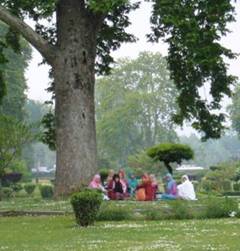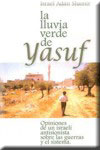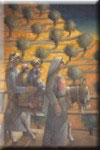India Comeback
By Israel Shamir
 India is as warm and comfortable as
ever. Over thirty years have passed since I roamed around in her cities and
temples as a young long-haired white-cotton- trousered journalist cub, but coming
back is easy. Things on the ground have not changed much – but they have
changed.
India is as warm and comfortable as
ever. Over thirty years have passed since I roamed around in her cities and
temples as a young long-haired white-cotton- trousered journalist cub, but coming
back is easy. Things on the ground have not changed much – but they have
changed.
It is the same dense, busy crowd in Old Delhi, but the terrible poverty and hunger has disappeared or been pushed away. There are beggars, but they appear to be Gypsy professionals who reputedly fly to summer vacation sites for their short season, rather than disaster-stricken Bihar peasants, who ask for our charity.
It is the same immense green lawns of the British-built New Delhi , but now they are frequented by middle class families picnicking in their Sunday garb.
Centuries-old Mughal gardens are bristling with visiting ladies clad in exquisite polychrome saris and with striped pyjama-fashion grey squirrels, but the palaces are in good repair and visitors do not feel threatened by their imminent collapse.
The smell of curry and baking bread still sojourns with that of jasmine and mango, but the once prevalent smell of Indian tobacco (I was almost arrested for smoking their fags in Europe ) has practically disappeared. Indians are almost saints: they do not smoke, do not drink alcohol and they rarely eat meat.
They are modest shoppers and modest dressers, though now there are decent western-style shops. The feet of Indians are still bare, but clean and pedicured. There are many jobless, but whoever has a job manages well even on a low salary. Now even lower middle class families have servants, as in 19th century Europe , and not just temporary help – real servants with separate duties: cooks, drivers, cleaners, errand boys. Cars and bikes have multiplied a hundred times in the past thirty years, but they still incessantly honk their horns.
Their sergeant-majors still boast the most fearsome moustaches and sideburns, but now they have nuclear weapons to boast about too. Next time, when imperial soldiers advance to India thinking “Whatever happens, we have got // The Maxim gun, and they have not”, they will be mistaken. India now has an impressive army with a goodly amount of arms; they have launched a few satellites and are on the way to becoming a power in space.
Indian Pundits
With their nuclear armoury and modest affluence, Indians are being heard today in the West – better than they were in the days of poverty, hunger and weakness. “The Wisdom of a poor man is despised”, says the Writ. Now we pay attention to Indian political thinkers, not only to the gurus. I had the honour to meet a few of the like-minded people in India. We publish Indian writers here. Among them, there is Ambassador Gajendra Singh, a man with first-hand knowledge of the Middle East, Turkey and East Europe. Another one is J C Kapur, whose text delivered in St Petersburg University is published here as well. We have also published Ambassador Bhadrakumar and Satya Sagar. Come Carpentier, a French expatriate living in India, Lille Singh, an Indian expatriate in New York, Syed Zaidi of Delhi -- all participate in our deliberations. We also publish and cherish the essays of Arundhati Roy and other Indian thinkers.It is not that India needs much of an army; but nukes and missiles are a modern way to prove a country’s virility. That is why the US and Israel are so stubbornly fighting against other countries having them – they want to be the only males in the harem with a few eunuchs on the side. They are trying to take Indian nukes under their control, too – and some say that the last India-US agreement is nothing less than a capitulation. I am not so sure: the Indian leaders have not acquiesced in the US drive against Iran , and this is an important criterion. President Ahmadinejad was better received in Delhi than President Bush. Another reason is the old tie: Persian was to India what French was to the rest of Europe , the language of civilisation and poetry.
Instinctively India , historically its first victim, can’t support the Empire against Iran . Today this Empire covers much of the unipolar world; it subdued Germany and Japan in two world wars, Moscow submitted in 1991, and since 2003, the Arab world is also cowed. But it began as a small trading post in East India . The British were the first carriers of modern Empire, and India was subdued by them centuries ago. We say “the British Empire , the American Empire”, but actually these countries were and are rather carriers of the Empire than her owners. The Empire is an independent parasite, the Alien, feeding on many nations including its proud carrier and enforcer. Gladstone was right in his argument against Disraeli: empire is not good for the mother country. Now, worn-out Britain is a junior partner in the enterprise; its head offices have moved from London to Washington and New York .
India was the laboratory for imperial devices. A long time before Baghdad was looted by the Americans, British troops in 1799 conquered and looted Seringapatam, the fortress capital of Mysore, and killed (beside tens of thousands of natives) Sultan Tipu, who twice defeated the Brits and who had nearly reverted the crawling colonisation of India. The Sultan was described as an “infamous tyrant, usurper and ruler of the most perfect despotism in the world”, the same title later ascribed to Saddam Hussein. All the horrors of occupation ever experienced by the enemies of the Empire were visited on Delhi in 1857, when British troops slaughtered millions of Indians in what was probably the greatest holocaust the world had ever known up to that time.
Still, Indians nurse no ill feelings towards the Brits. They fought and died by their tens of thousands for England in the WWI and WWII. Now they are proud to be part of the Commonwealth, happily speak English, shop on Oxford Street and visit their relatives in Earls Court . The old-timers miss the British days (perhaps it is the time of their youth they miss). Captain Nemo with his dream of vengeance was, after all, invented by the French writer Jules Verne, not by an Indian. Indians are not vengeful by nature. English is also the lingua franca of this huge country and, by default, the language of many wonderful Indian writers, from Arundhati Roy to Salman Rushdie, who would be unknown outside of their provinces. Thanks to the ubiquity of English, India is the preferred country for outsourcing, and this has provided it with considerable income.
The new Indian affluence is thinly spread. There were always rich Indians, and that’s why there were always so many poor Indians. Even for outsourcing and similar crumb-sharing schemes, Indians pay a high price: Western companies have made huge inroads into the Indian economy. The courts do not defend ordinary Indians against the multinationals. They could take a leaf from the Canadians, who ruled in favour of a farmer against Monsanto in 2008. The countryside remains very poor, but the country is so huge, and there are so many people, that the lower middle class is quite numerous, and even they have servants aplenty.
Until recently, the Empire placed its bet on Pakistan -- now India has become stronger and more attractive. This is a fateful hour – if India should once again become its crown jewel, the Empire would engulf China and undermine South East Asia . The US continues flirting with India , offering American weaponry while demanding that it toe the line on Iran and China , and some forces in India are ready to embrace the Americans. It is therefore all the more important to keep India friendly to China , to Russia , to Iran and the Muslim world.
The bottom line is that India today is not as strongly anti-imperialist as she was in the days of Nehru and his friendship with Nasser, Tito and Fidel, but she has not switched sides completely, either. She is rather biding her time, playing cricket.
Despite the rise of Hindu fundamentalism, fuelled (and paid for) by second-generation Indian Americans and by the US State Department, India is not a natural enemy to the Muslim world. It's the other way around: sixty years after the Partition, North India (including Delhi ) has a distinctly Muslim flavour. If Pakistan had not been created, Islam would probably predominate in India . The founders of Pakistan had a strange idea that the Hindus would seek revenge on their former masters; as a result, some space was vacated, leaving room for a Hindu revival. This revival is not entirely natural, as revivals go: they built in Delhi a vast, bright and garish complex of Hindu temples. The statues of Hindu gods, terrifying and bewildering when venerable and old, give the impression of a kind of Disneyland when shining and new. Films like Ramayana have filled in the chasm between the sacred and profane, and one is left wondering: are these the statues of gods or of movie characters? This is not to say that the Hindu religion is dead: there are millions of small shrines on every corner, and all passers-by do their obeisance. These small shrines are islands of calm in the turbulent world, and surely they are greatly needed and appreciated.
However, the mosques in the Indian capital are still much more impressive than the Hindu temples. Everything pre-British is Muslim-built, as for a thousand years, ever since Mahmud of Ghazna, the rulers of Hindustan have been Muslims. The warlike neighbours of pacific Indians, - Afghanis, Central Asians, Persians and Turks conquered North India and colonised it. They were quite tolerant and friendly to their non-Muslim subjects, giving the lie to modern claims that Muslims are harsh rulers when it comes to infidels. Judging by Indian films, they lived well together in mutual respect. Not that I consider Indian films an authority on history, but surely they express some popular feeling on the subject.
The invaders of the 16th century became fully subsumed in India . Hindus and Muslims venerate the same tombs of the same saints and celebrate the same feasts. I tried to provoke my Muslim Indian friends by asking them: “Aren’t you upset by seeing Indian idols? Shouldn’t one remove them?” But they did not even understand the thought: “They worship one way, we worship other way; God is anyway one and the same for all of us”, they replied. Many native Indians embraced Islam, and eventually Islam became as Indian as Hinduism or Buddhism.






















